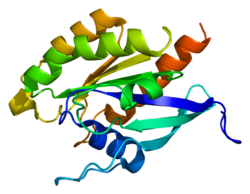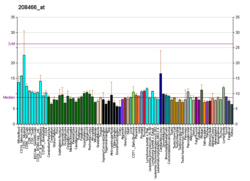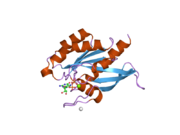RAB3D
Appearance
Ras-related protein Rab-3D is a protein that in humans is encoded by the RAB3D gene.[5][6][7]
References
[edit]- ^ a b c GRCh38: Ensembl release 89: ENSG00000105514 – Ensembl, May 2017
- ^ a b c GRCm38: Ensembl release 89: ENSMUSG00000019066 – Ensembl, May 2017
- ^ "Human PubMed Reference:". National Center for Biotechnology Information, U.S. National Library of Medicine.
- ^ "Mouse PubMed Reference:". National Center for Biotechnology Information, U.S. National Library of Medicine.
- ^ Nishio H, Suda T, Sawada K, Miyamoto T, Koike T, Yamaguchi Y (Mar 1999). "Molecular cloning of cDNA encoding human Rab3D whose expression is upregulated with myeloid differentiation". Biochim Biophys Acta. 1444 (2): 283–90. doi:10.1016/s0167-4781(98)00279-6. PMID 10023084.
- ^ Chen XN, Shi ZY, Korenberg JR, Sehgal A (Mar 1999). "Assignment of the GOV (Glioblastoma overexpressed) gene to human chromosome band 19p13.2 by fluorescence in situ hybridization". Cytogenet Cell Genet. 83 (3–4): 230–1. doi:10.1159/000015187. PMID 10072586. S2CID 24430172.
- ^ "Entrez Gene: RAB3D RAB3D, member RAS oncogene family".
Further reading
[edit]- Brondyk WH, McKiernan CJ, Fortner KA, et al. (1995). "Interaction cloning of Rabin3, a novel protein that associates with the Ras-like GTPase Rab3A". Mol. Cell. Biol. 15 (3): 1137–43. doi:10.1128/MCB.15.3.1137. PMC 230335. PMID 7532276.
- Sehgal A, Keener C, Boynton AL, et al. (1997). "Isolation and characterization of a novel gene from human glioblastoma multiforme tumor tissue". Int. J. Cancer. 71 (4): 565–72. doi:10.1002/(SICI)1097-0215(19970516)71:4<565::AID-IJC10>3.0.CO;2-B. PMID 9178809.
- Raffaniello RD, Raufman JP (1999). "Cytosolic RAB3D is associated with RAB escort protein (REP), not RAB-GDP dissociation inhibitor (GDI), in dispersed chief cells from guinea pig stomach". J. Cell. Biochem. 72 (4): 540–8. doi:10.1002/(SICI)1097-4644(19990315)72:4<540::AID-JCB9>3.0.CO;2-D. PMID 10022613. S2CID 35820873.
- Cartel NJ, Wang J, Post M (2002). "Platelet-derived growth factor-BB-mediated glycosaminoglycan synthesis is transduced through Akt". Biochem. J. 363 (Pt 1): 19–28. doi:10.1042/0264-6021:3630019. PMC 1222446. PMID 11903042.
- Riedel D, Antonin W, Fernandez-Chacon R, et al. (2002). "Rab3D Is Not Required for Exocrine Exocytosis but for Maintenance of Normally Sized Secretory Granules". Mol. Cell. Biol. 22 (18): 6487–97. doi:10.1128/MCB.22.18.6487-6497.2002. PMC 135623. PMID 12192047.
- Strausberg RL, Feingold EA, Grouse LH, et al. (2003). "Generation and initial analysis of more than 15,000 full-length human and mouse cDNA sequences". Proc. Natl. Acad. Sci. U.S.A. 99 (26): 16899–903. Bibcode:2002PNAS...9916899M. doi:10.1073/pnas.242603899. PMC 139241. PMID 12477932.
- Fukuda M (2003). "Distinct Rab binding specificity of Rim1, Rim2, rabphilin, and Noc2. Identification of a critical determinant of Rab3A/Rab27A recognition by Rim2". J. Biol. Chem. 278 (17): 15373–80. doi:10.1074/jbc.M212341200. PMID 12578829.
- Nguyen D, Jones A, Ojakian GK, et al. (2003). "Rab3D redistribution and function in rat parotid acini". J. Cell. Physiol. 197 (3): 400–8. doi:10.1002/jcp.10373. PMID 14566969. S2CID 33152672.
- Matsumoto M, Miki T, Shibasaki T, et al. (2004). "Noc2 is essential in normal regulation of exocytosis in endocrine and exocrine cells". Proc. Natl. Acad. Sci. U.S.A. 101 (22): 8313–8. Bibcode:2004PNAS..101.8313M. doi:10.1073/pnas.0306709101. PMC 420391. PMID 15159548.
- Knop M, Aareskjold E, Bode G, Gerke V (2005). "Rab3D and annexin A2 play a role in regulated secretion of vWF, but not tPA, from endothelial cells". EMBO J. 23 (15): 2982–92. doi:10.1038/sj.emboj.7600319. PMC 514934. PMID 15257287.
- Gerhard DS, Wagner L, Feingold EA, et al. (2004). "The Status, Quality, and Expansion of the NIH Full-Length cDNA Project: The Mammalian Gene Collection (MGC)". Genome Res. 14 (10B): 2121–7. doi:10.1101/gr.2596504. PMC 528928. PMID 15489334.
- Rual JF, Venkatesan K, Hao T, et al. (2005). "Towards a proteome-scale map of the human protein-protein interaction network". Nature. 437 (7062): 1173–8. Bibcode:2005Natur.437.1173R. doi:10.1038/nature04209. PMID 16189514. S2CID 4427026.







